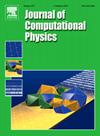A DSMC-CFD coupling method using surrogate modelling for low-speed rarefied gas flows
IF 3.8
2区 物理与天体物理
Q2 COMPUTER SCIENCE, INTERDISCIPLINARY APPLICATIONS
引用次数: 0
Abstract
A new Micro-Macro-Surrogate (MMS) hybrid method is presented that couples the Direct Simulation Monte Carlo (DSMC) method with Computational Fluid Dynamics (CFD) to simulate low-speed rarefied gas flows. The proposed MMS method incorporates surrogate modelling instead of direct coupling of DSMC data with the CFD, addressing the limitations CFD has in accurately modelling rarefied gas flows, the computational cost of DSMC for low-speed and multiscale flows, as well as the pitfalls of noise in conventional direct coupling approaches. The surrogate models, trained on the DSMC data using Bayesian inference, provide noise-free and accurate corrections to the CFD simulation enabling it to capture the non-continuum physics. The MMS hybrid approach is validated by simulating low-speed, steady-state, force-driven rarefied gas flows in a canonical 1D parallel-plate system, where corrections to the boundary conditions and stress tensor are considered and shows excellent agreement with DSMC benchmark results. A comparison with the typical domain decomposition DSMC-CFD hybrid method is also presented, to demonstrate the advantages of noise-avoidance in the proposed approach. The method also inherently captures the uncertainty arising from micro-model fluctuations, allowing for the quantification of noise-related uncertainty in the predictions. The proposed MMS method demonstrates the potential to enable multiscale simulations where CFD is inaccurate and DSMC is prohibitively expensive.
低速稀薄气体流的代用建模 DSMC-CFD 耦合方法
本文介绍了一种新的微观-宏观-代用(MMS)混合方法,它将直接模拟蒙特卡罗(DSMC)方法与计算流体动力学(CFD)相结合,模拟低速稀薄气体流动。所提出的 MMS 方法采用了代用模型,而不是将 DSMC 数据与 CFD 直接耦合,从而解决了 CFD 在精确模拟稀薄气体流动方面的局限性、DSMC 在低速和多尺度流动方面的计算成本以及传统直接耦合方法中的噪声隐患。使用贝叶斯推理方法在 DSMC 数据上训练的代用模型为 CFD 模拟提供了无噪声的精确修正,使其能够捕捉到非连续的物理特性。MMS 混合方法通过模拟典型一维平行板系统中的低速、稳态、力驱动稀薄气体流进行了验证,其中考虑了对边界条件和应力张量的修正,并显示出与 DSMC 基准结果的极佳一致性。此外,还与典型的域分解 DSMC-CFD 混合方法进行了比较,以展示所提议方法在避免噪声方面的优势。该方法还能捕捉微观模型波动带来的不确定性,从而量化预测中与噪声相关的不确定性。拟议的 MMS 方法展示了在 CFD 不准确、DSMC 昂贵的情况下进行多尺度模拟的潜力。
本文章由计算机程序翻译,如有差异,请以英文原文为准。
求助全文
约1分钟内获得全文
求助全文
来源期刊

Journal of Computational Physics
物理-计算机:跨学科应用
CiteScore
7.60
自引率
14.60%
发文量
763
审稿时长
5.8 months
期刊介绍:
Journal of Computational Physics thoroughly treats the computational aspects of physical problems, presenting techniques for the numerical solution of mathematical equations arising in all areas of physics. The journal seeks to emphasize methods that cross disciplinary boundaries.
The Journal of Computational Physics also publishes short notes of 4 pages or less (including figures, tables, and references but excluding title pages). Letters to the Editor commenting on articles already published in this Journal will also be considered. Neither notes nor letters should have an abstract.
 求助内容:
求助内容: 应助结果提醒方式:
应助结果提醒方式:


